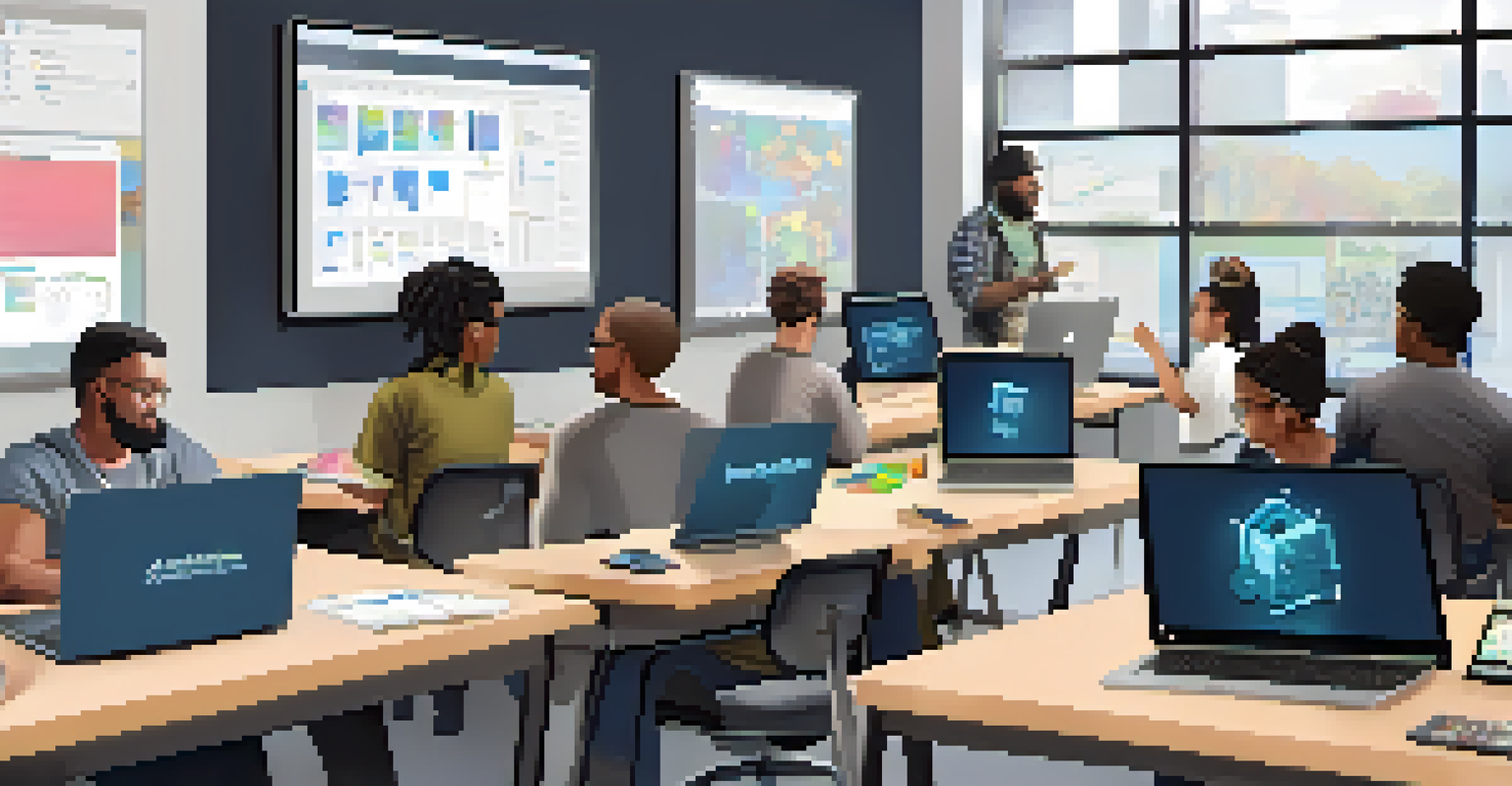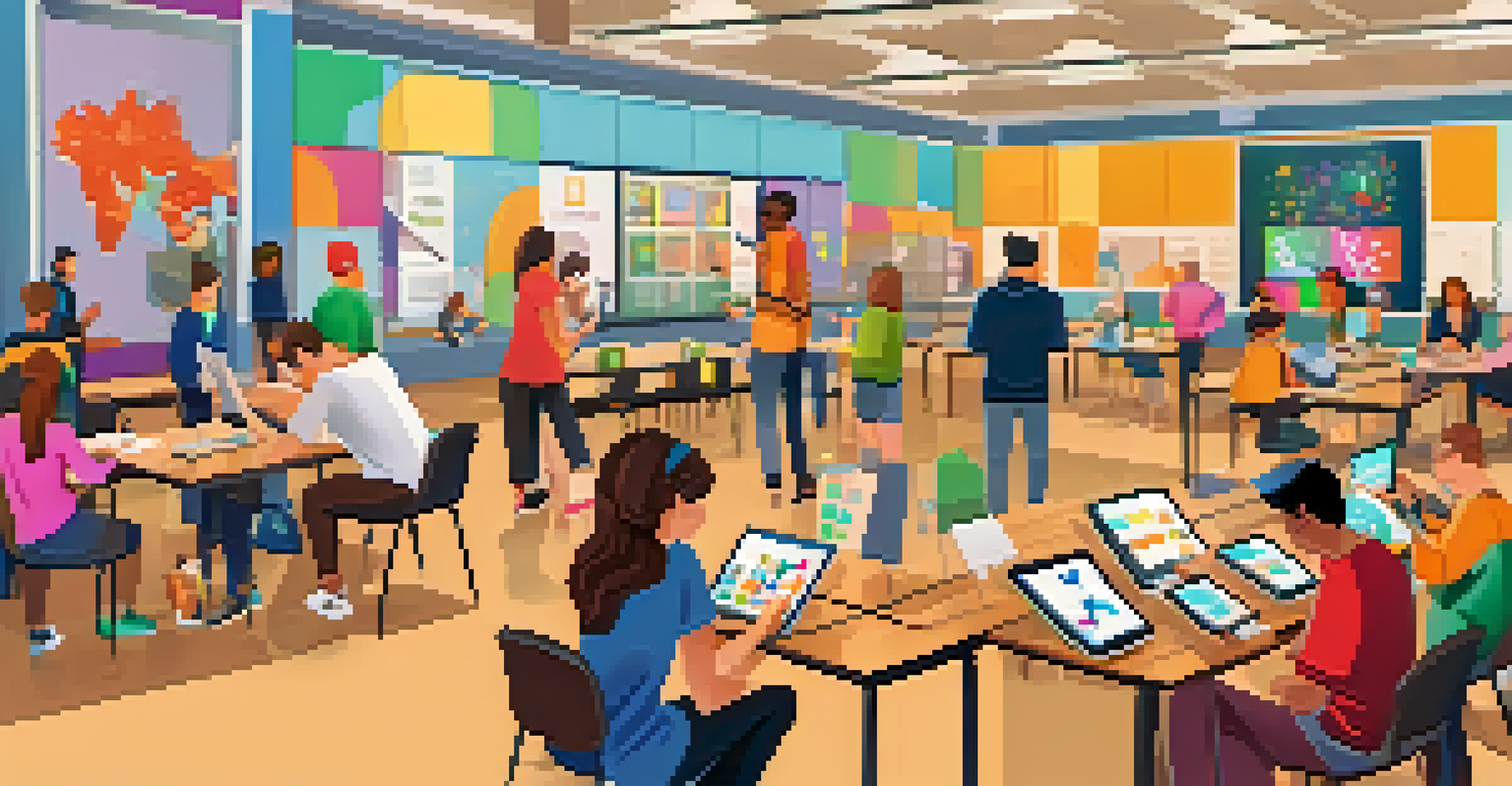Community Initiatives to Enhance Digital Learning Opportunities

Understanding the Importance of Digital Learning
In today's tech-driven world, digital learning is more crucial than ever. It opens doors to knowledge and skills that are essential for both personal and professional growth. Communities that invest in digital learning initiatives help bridge the gap between those with access to technology and those without, fostering inclusion and equity.
Education is the most powerful weapon which you can use to change the world.
Moreover, digital learning enhances the educational experience, making it more engaging and interactive. For instance, online resources allow students to learn at their own pace, catering to different learning styles. This flexibility is particularly beneficial for adult learners juggling work and family responsibilities.
Ultimately, by prioritizing digital learning, communities can empower their members, ensuring that everyone has the opportunity to thrive in the digital age. This empowerment can lead to improved job prospects and a more informed citizenry, which is vital for a progressive society.
Local Libraries as Digital Learning Hubs
Local libraries have evolved from traditional book repositories to vibrant digital learning hubs. They offer free access to computers, high-speed internet, and various online resources, making technology accessible to everyone. Many libraries also provide digital literacy classes, introducing community members to essential tech skills.

These initiatives not only elevate the community's educational standards but also foster a sense of belonging. For example, a person who may feel isolated due to a lack of tech knowledge can find support and camaraderie through library programs. This creates a welcoming environment that encourages continuous learning.
Digital Learning Bridges Gaps
Investing in digital learning initiatives fosters inclusion and equity by providing access to technology and knowledge for all.
Additionally, libraries often collaborate with local organizations to expand their offerings. By hosting workshops and events, they bring together experts and community members, creating a rich tapestry of learning opportunities that benefit all.
Community Workshops and Training Programs
Community workshops and training programs are another effective way to enhance digital learning. These initiatives can range from coding boot camps to social media marketing classes, catering to various interests and skill levels. They provide hands-on experiences that are often more impactful than traditional classroom settings.
Technology is best when it brings people together.
For example, a local nonprofit might partner with tech professionals to offer a series of free workshops on digital skills. Participants not only gain valuable knowledge but also build connections with industry experts and peers. These relationships can lead to mentorship opportunities and even job placements.
Moreover, such workshops promote lifelong learning, encouraging individuals to continually update their skills in an ever-evolving digital landscape. This proactive approach to education helps communities stay relevant and competitive in the job market.
Leveraging Technology for Remote Learning
In the wake of recent global events, remote learning has become a cornerstone of education. Communities are leveraging technology to ensure that learning continues, even from a distance. This shift has led to innovative solutions that make digital learning more accessible to all.
For instance, local schools may implement virtual classrooms, allowing students to attend lessons from home. This flexibility is particularly crucial for those with health concerns or transportation issues. Additionally, recorded sessions enable learners to revisit content at their convenience, reinforcing their understanding.
Libraries as Learning Community Hubs
Local libraries have transformed into vibrant digital learning centers, offering resources and classes that promote digital literacy and community engagement.
However, it's important to recognize the challenges that come with remote learning, such as the digital divide. Communities must work together to ensure that every student has the necessary tools—like devices and internet access—to succeed in this new landscape.
Partnerships with Local Businesses
Collaboration between local businesses and educational institutions can significantly enhance digital learning initiatives. Businesses often have the resources and expertise needed to provide training and mentorship. By partnering with schools or community centers, they can share their knowledge and help shape a skilled workforce.
For example, a tech company might offer internships to high school students, providing them with real-world experience in the digital field. This not only benefits the students but also helps businesses nurture future talent. Such partnerships create a win-win situation for both parties.
Furthermore, businesses can sponsor workshops or provide equipment, boosting community learning efforts. This investment in local education fosters a sense of responsibility and engagement, showing that businesses value their community's growth.
Incorporating Gamification in Learning
Gamification is a powerful tool that can make digital learning more engaging and enjoyable. By incorporating game-like elements into educational programs, communities can motivate learners in a fun way. This approach appeals to younger audiences while also providing a refreshing twist for adult learners.
For example, a community center might host a digital scavenger hunt, encouraging participants to use their tech skills to solve puzzles. This interactive experience not only reinforces learning but also fosters teamwork and problem-solving abilities. It's a great way to build community while enhancing digital literacy.
Collaboration Enhances Learning
Partnerships between businesses and educational institutions create valuable training opportunities and resources, benefiting both learners and the community.
In addition, gamified learning often leads to better retention of information. When learners are actively engaged and having fun, they are more likely to remember what they've learned, making the educational process both effective and enjoyable.
Creating Safe Online Spaces for Learning
As digital learning becomes more prevalent, creating safe online spaces is paramount. Communities must prioritize cybersecurity and digital etiquette, ensuring that learners can explore and engage without fear. This includes teaching individuals how to protect their personal information and recognize online threats.
Many organizations are stepping up to address these concerns by offering workshops on online safety. These programs educate community members on best practices for navigating the digital world responsibly. By fostering a culture of safety, communities empower individuals to use technology confidently.

Moreover, creating supportive online environments encourages more people to participate in digital learning initiatives. When individuals feel secure and respected online, they are more likely to engage fully, leading to a richer learning experience.
The Future of Digital Learning in Communities
Looking ahead, the future of digital learning in communities is promising. As technology continues to evolve, so will the ways in which we learn and teach. Communities that embrace these changes will be better positioned to meet the educational needs of their members.
Innovative approaches, such as virtual reality and artificial intelligence, are already starting to reshape the educational landscape. These technologies offer exciting possibilities for immersive learning experiences that can enhance understanding and engagement. Communities that invest in these tools will provide their members with unique opportunities.
Ultimately, the key to successful digital learning initiatives lies in collaboration. By working together—libraries, businesses, schools, and individuals—communities can create a robust ecosystem that supports lifelong learning and adapts to the needs of a diverse population.